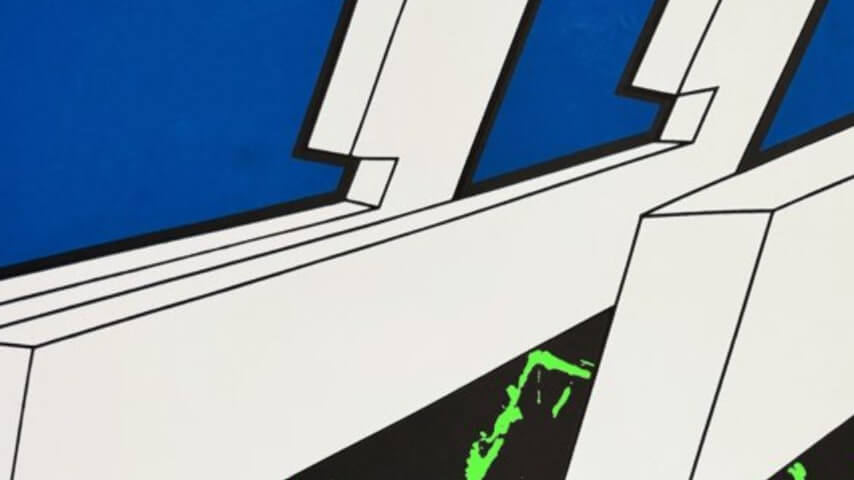It can feel a bit tired to mourn the corners of the web you wish you’d archived somehow, but I regularly find myself missing one of the first music blogs I ever loved, The Le Sigh. We’re now eight years removed from the blog’s announced hiatus and the site is indefinitely down; what ephemera is left can be found in chunks on the Internet Archive, or in fragile parts of the social platform economy. Your teachers and parents meant well when they said “what’s on the internet is forever,” but their advice wasn’t to be taken literally. As the online content mills keep churning out new and mind-numbing slop, it can be easy to disappear older artifacts from the digital world. Daniel Lopatin, the composer behind Oneohtrix Point Never, knows this all too well.
Lopatin’s latest and eleventh Oneohtrix Point Never album, Tranquilizer, is carefully crafted from a digital sample compilation that he discovered on the Internet Archive and bookmarked for eventual use. Oneohtrix Point Never albums, 2011’s Replica especially, make liberal use of sonic ephemera, whether they be royalty-free samples or bootlegs of 20th-century TV ads, and those vaguely familiar sounds have an alluring quality that Lopatin harnesses before putting his mischievous spin on them. There are micro-moments of comfort punctured by crashes, clangs, and whooshes that send listeners bouncing between motifs. Under Lopatin’s direction, this particular sample pack could’ve become anything. However, the Internet Archive is as fragile as the rest of the internet, and the samples vanished one day, leaving Lopatin kicking himself that he hadn’t thought to deploy more heroic measures to save them to his device when he had a chance.
Incredibly, they came back online later. The banal reality of an underutilized sample compilation bumping in and out of existence became something that Lopatin couldn’t forget, so Tranquilizer turned into a meditation on this digital ephemerality. The album is a glowing return to form, as Lopatin leaves most of his songs in a state of near disarray, departing from the more pop-oriented structures that characterized 2020’s Magic Oneohtrix Point Never and 2023’s Again. While Lopatin proved himself a more than capable left-of-center pop composer and vocalist on those projects, he truly thrives in these freeform spaces.
The songs that make up Tranquilizer don’t have the naked beauty you might have heard on Again, or the intensity of concept or execution of Garden of Delete, but that’s part of what makes the album work so well now. If the internet of today is a harsh cyberscape where it’s impossible to keep track of what actually makes you feel at ease, then Tranquilizer is a suitable soundtrack for the modern endless scroll. The samples stutter, buffer, enter, and fall away without warning, turning each track into a mini-journey where you start at point A and end askew on another plane. “Bumpy,” for example, starts with layers of samples that seem off-center, masking what could be a discernible beat, before evaporating into a cosmic stew of rhythm and mist that feel legible but fleeting. The beginning of “Lifeworld” arrives straight out of an action movie, recursing upon itself like a telltale heart while upping the tension with every swoosh.
The vast blankets of sound that open “D.I.S.” get poked with clicks and crackles that sound like it’s disintegrating in real time, only to move from legato passages with minor imperfections into a skittering mess before ending in the relative calm of an arpeggiating piano line. Tranquilizer’s songs threaten to come undone only to reconstitute later into something entirely new. If the original samples were designed to be as unobtrusive and familiar to the listener as possible, then Lopatin’s compositions show flashes of that easy listening while stretching, compressing, and reworking every other sound to disrupt the experience. It’s not unlike what the big social platforms do to foment engagement, leading to juiced stats and financial returns.
With Tranquilizer though, it doesn’t feel like Lopatin is trying to make any grand conjectures about the state of our digital world. It’s one thing to acknowledge the problems that erected a barrier between him and his sample pack; it’s quite another to compose music that articulates definitive conclusions about the tragedy of lost media, or the dangers of lackluster archiving. Between the euphoric eruptions of “Rodl Glide” or the dark abstractions on “Vestigel,” it feels more like Lopatin is intent on seizing this opportunity to turn his prized samples into tours de force. The fact that Tranquilizer almost didn’t happen, and none of us would’ve known it, is itself a compelling piece of commentary about our shared fragility. The songs may exhibit a slipperiness that makes them the opposite of tranquilizing, but that’s not far off from the experience of Replica or 2013’s R Plus Seven. Tranquilizer is Oneohtrix Point Never’s return to a form that feels both especially called for and markedly beautiful.
Devon Chodzin is a Pittsburgh-based critic and urban planner with bylines at Aquarium Drunkard, Stereogum, Bandcamp Daily, and more. He can be found on social media, sometimes.

 Keep scrolling for more great stories.
Keep scrolling for more great stories.
